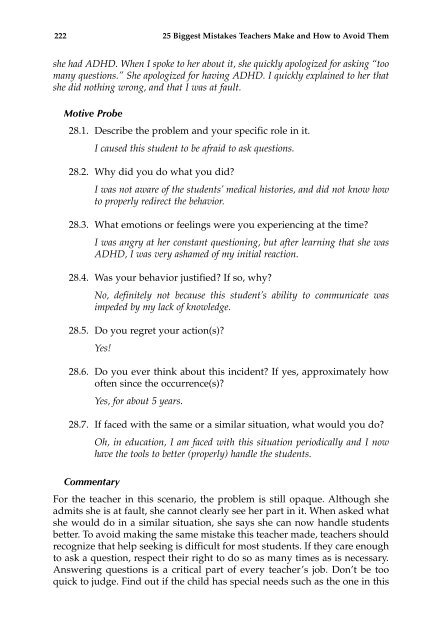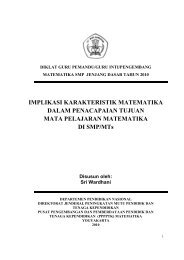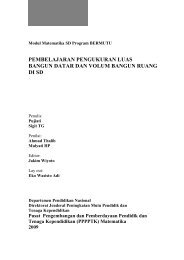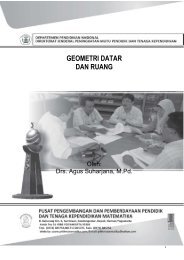25 Biggest Mistakes Teachers Make and How to Avoid Them
25 Biggest Mistakes Teachers Make and How to Avoid Them
25 Biggest Mistakes Teachers Make and How to Avoid Them
You also want an ePaper? Increase the reach of your titles
YUMPU automatically turns print PDFs into web optimized ePapers that Google loves.
222 <strong>25</strong> <strong>Biggest</strong> <strong>Mistakes</strong> <strong>Teachers</strong> <strong>Make</strong> <strong>and</strong> <strong>How</strong> <strong>to</strong> <strong>Avoid</strong> <strong>Them</strong><br />
she had ADHD. When I spoke <strong>to</strong> her about it, she quickly apologized for asking “<strong>to</strong>o<br />
many questions.” She apologized for having ADHD. I quickly explained <strong>to</strong> her that<br />
she did nothing wrong, <strong>and</strong> that I was at fault.<br />
Motive Probe<br />
28.1. Describe the problem <strong>and</strong> your specific role in it.<br />
I caused this student <strong>to</strong> be afraid <strong>to</strong> ask questions.<br />
28.2. Why did you do what you did?<br />
I was not aware of the students’ medical his<strong>to</strong>ries, <strong>and</strong> did not know how<br />
<strong>to</strong> properly redirect the behavior.<br />
28.3. What emotions or feelings were you experiencing at the time?<br />
I was angry at her constant questioning, but after learning that she was<br />
ADHD, I was very ashamed of my initial reaction.<br />
28.4. Was your behavior justified? If so, why?<br />
No, definitely not because this student’s ability <strong>to</strong> communicate was<br />
impeded by my lack of knowledge.<br />
28.5. Do you regret your action(s)?<br />
Yes!<br />
28.6. Do you ever think about this incident? If yes, approximately how<br />
often since the occurrence(s)?<br />
Yes, for about 5 years.<br />
28.7. If faced with the same or a similar situation, what would you do?<br />
Commentary<br />
Oh, in education, I am faced with this situation periodically <strong>and</strong> I now<br />
have the <strong>to</strong>ols <strong>to</strong> better (properly) h<strong>and</strong>le the students.<br />
For the teacher in this scenario, the problem is still opaque. Although she<br />
admits she is at fault, she cannot clearly see her part in it. When asked what<br />
she would do in a similar situation, she says she can now h<strong>and</strong>le students<br />
better. To avoid making the same mistake this teacher made, teachers should<br />
recognize that help seeking is difficult for most students. If they care enough<br />
<strong>to</strong> ask a question, respect their right <strong>to</strong> do so as many times as is necessary.<br />
Answering questions is a critical part of every teacher’s job. Don’t be <strong>to</strong>o<br />
quick <strong>to</strong> judge. Find out if the child has special needs such as the one in this





